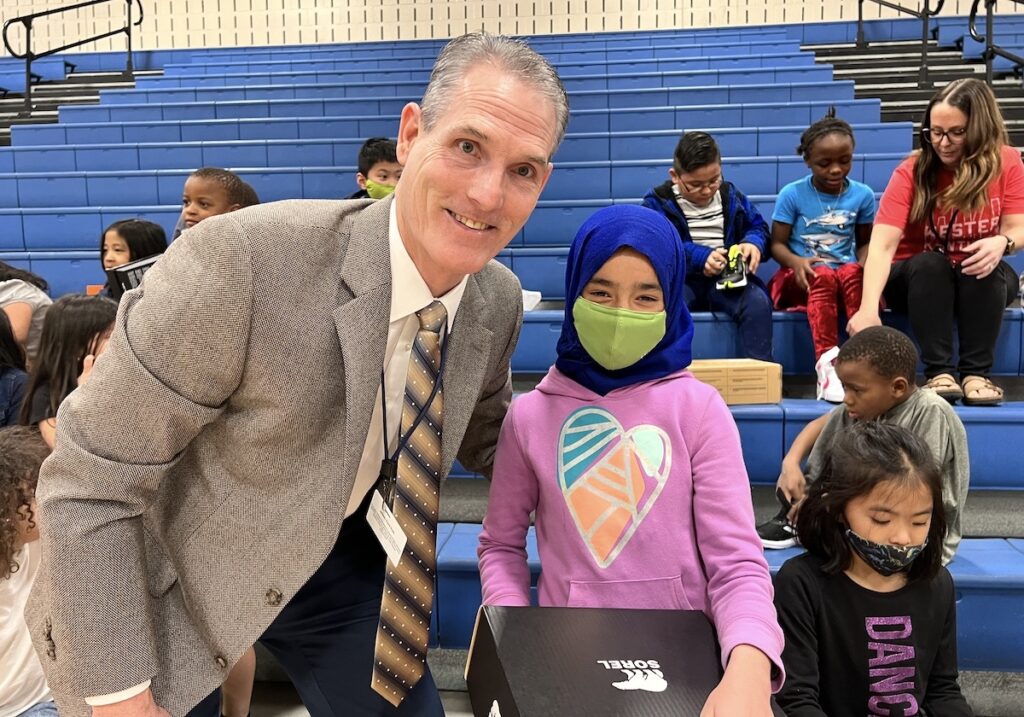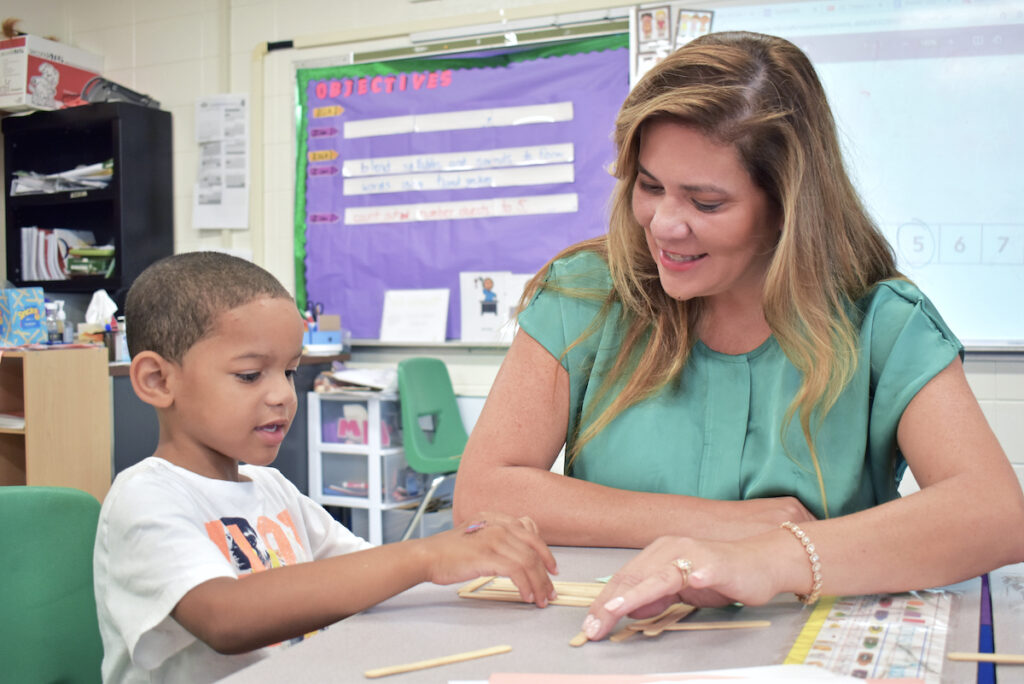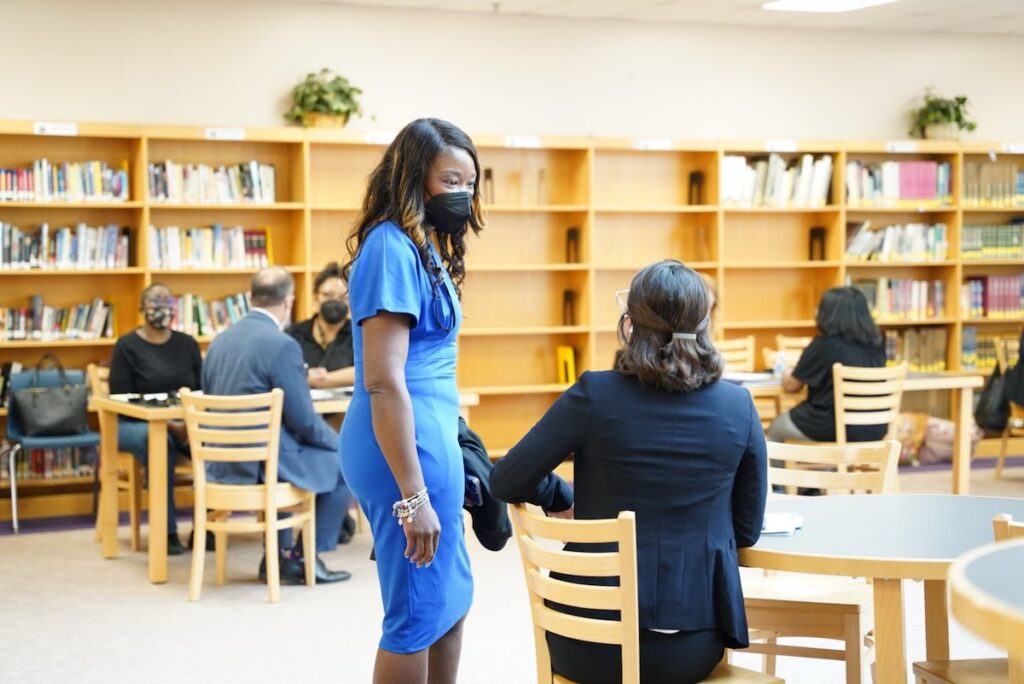Growing leadership capacity is a top priority in Warren County Public Schools because it’s key to improving teaching and learning, Superintendent Rob Clayton says. The Kentucky district has created an Administrator Support Network and an Aspiring Administrators Academy where educators participate in collaborative activities that build managerial and instructional leadership skills.
Those are the primary skill areas where new administrators often need additional guidance, says Clayton, the 2023 Kentucky superintendent of the year. “Effective communication has been and will continue to be our primary focus as we work to minimize unnecessary distractions within our organization,” he explains. “The majority of challenges we face in our schools are directly related to some form of communication whether it be miscommunication, a lack of communication, or untimely communication.”
Clayton also mentors new superintendents as a Kentucky Association of School Administrators faculty member. He felt an obligation to give back for the support he received as an aspiring administrator. “This experience benefited my own professional growth as a leader since ideas and strategies were routinely shared throughout the onboarding process,” he says. “The superintendency is a complex position of leadership.”
Clayton’s work represents how District Administration’s latest “superintendents to watch” are striving to uplift their students, staff and communities through leadership, fairness and fun.
Rebranding the profession
Clayton and his team’s belief in providing equitable opportunities for all students relies, in part, on a network of partnerships with local businesses and community organizations. Each year, about 1,200 eighth-graders explore career pathways and participate in career shadowing as part of the district’s SCK (South Central Kentucky) Launch initiative. Another focus of the district’s partnerships is early childhood education.”
“The primary benefit of these partnerships is leveling the playing field for our most vulnerable students who are relying upon us to provide them with the experiences necessary to help them gain confidence and enhance their skills and abilities,” Warren says.

Warren County’s students are making continuous improvements in achievement, graduation rate, and college/career readiness. Even more recently, he notes, the district has provided extensive support to families during times of crisis. After a tornado outbreak last December, the school community raised more than $1.2 million and staff volunteered thousands of hours. This summer, the district collected books, furniture, and $21,000 in gift cards for the Eastern Kentucky school districts hit by devastating floods.
Warren County’s 2022-23 Scorecard lists three of its top three priorities:
- Be an outstanding place for employees to work, students to learn, and parents and community members to support.
- Become a community where all stakeholders serve and engage in partnerships to support high levels of student success.
- Engage students in a broad range of learning, extra-curricular, and post-secondary opportunities.
Among Clayton’s biggest concerns is getting adequate funding to accommodate growing enrollment, particularly when it comes to educating the most vulnerable students. The other challenges he’s anticipating: “Rebranding the teaching profession in order to attract, hire, and retain the highest quality of people to work with our students,” he concludes. “Combatting the anti-public school education rhetoric in the media that creates unnecessary distractions for school staff.”
Launching wraparound leadership
A school board that’s ideologically, racially and generationally diverse allows the Waukegan Community Unit School District 60 community to have courageous conversations about equity, Superintendent Theresa Plascencia says. The district now conducts equity policy reviews to analyze whether decisions made by leadership create unintended barriers for students, staff, or families.

Waukegan, which recently hired its first equity and inclusion director, also trains board members and leadership in cultural awareness, unconscious bias, emotional intelligence, civility and the value of mutual respect. “It’s a continuous improvement cycle to assist principals and district leaders in becoming equity-driven school leaders by focusing on student data and teacher practice,” says Plascencia, who received a National Champions of Equity Award from the Association of Latino Administrators and Superintendents in 2021. “This provides a structure of coaching, mentoring, modeling, and defining key leadership actions with student outcomes and teacher practice at the heart and focus of this work.”
Superintendents Summit
The District Administration Superintendents Summit offers cutting-edge professional development to school district superintendents and other senior education executives to inspire innovation and leadership excellence in K-12 education. Upcoming events in this series:
Nov 9 – Nov 11: Omni La Costa Resort & Spa, Carlsbad, CA
Dec 14 – Dec 16: Ponte Vedra Inn & Club, Ponte Vedra, FL
Curriculum mapping is another priority for the district in 2022-23. Biliteracy is driving the development of standards-based curricula that teachers will use in monolingual and dual-language classrooms. The new units of study, which include culturally relevant materials, are accessible through a district-created online platform. Plascencia’s team is also planning to open one of Illinois’ only “wraparound centers” to provide more complete services to students, families, and community members with issues regarding mental health, violence, and interactions with the child welfare and criminal justice system.
Among the biggest challenges ahead is tackling the impact of COVID on student learning. The district has expanded after-school tutoring for individuals and small groups of students and is also providing more counseling support. Plascencia is also coping with an employee shortage that has forced the district to ramp up its recruiting efforts both in the Chicago metropolitan area and internationally. “By building important pipelines with Spain, Puerto Rico and the Philippines, we have been able to address many of our hard-to-fill positions,” she says.
Staff, particularly paraprofessionals, also have more opportunities to become classroom teachers while educators hoping to move into administrative positions are mentored in Waukegan’s “Future and Inspiring Leaders program.” To contend with burnout, staff members are eligible for a $1,000 retention award and have been given more time during the day for self-care activities.
She remains proud of how her staff came together to shift to remote instruction and support students and families through the pandemic. The district accelerated its 1-to-1 rollout to get devices to each student and provided Wi-Fi access with mobile hotspots and outside its school buildings. Transportation and child nutrition teams delivered food to 116 locations across town twice a week, serving more than two million meals to students. The district also hosted more than a dozen vaccination clinics in for students, parents and staff.
More from DA: Staffing struggles—Here is where teacher shortages are hitting K-12 hardest
“Of course, a lot of work and effort would not have been possible without constant collaboration with our bargaining units,” she says. “I can’t say enough about how important those lines of communication were, to be able to find solutions and resolutions for many issues, and to safely reopen our schools.”
Public education offers hope
Students in Ypsilanti Community Schools are facing a significant level of unfinished learning emerging from the pandemic. This past summer, the Michigan district located Grizzly Learning Camps at community centers, housing developments and churches in an intensive effort to help students bounce back with project-based learning and other activities designed to be more engaging than the traditional summer school curriculum, Superintendent Alena Zachery-Ross says.
About one-third of the district’s students attended summer school this summer and in 2021.

Throughout the summer programs and into the new school year, educators have focused on social-emotional well-being—for both students and themselves. In an effort to remove the stigma of asking for help, “oasis rooms” have been opened in the district’s schools to provide a place for students and staff to calm themselves. Students can also ask for restorative justice circles when disciplinary issues arise. “We’ve got to remove the barriers because that’s what gets us to the learning,” she adds.
Ypsilanti is also launching three newcomer centers to assist students, including refugees to the U.S., who are starting school this fall but speak little to no English. These students will also receive school supplies, backpacks and other essentials, such as haircuts. “It sounds simple but these things aren’t that simple when you’re a newcomer,” Zachery-Ross says. These students are also eligible for tutoring through a Bright Futures partnership with Eastern Michigan University.
Among her biggest concerns going forward are the teacher pipeline and the violence students have been exposed to in their neighborhoods. The district has received a $5 million teacher retention grant, which it plans to use to enhance professional development and leadership programs to build the capacity of its educators.
After-school programs are key to giving students safe spaces that shield them from violence in the community. “Physical and psychological safe spaces are so important when students don’t have another place to be,” she says. “We have to be that safe place.” Zachery-Ross and her team are now figuring out how to create before-school programs that will provide not only safe spaces earlier in the morning but offer engaging activities that jumpstart students’ creativity and love for learning. This is particularly important for students who are receiving interventions or other remediation during the school day.
“People ought to look to public education as the hope—as the key to the promises made to children,” she concludes. “There is so much good that comes from looking to our students and what they’re doing.”









